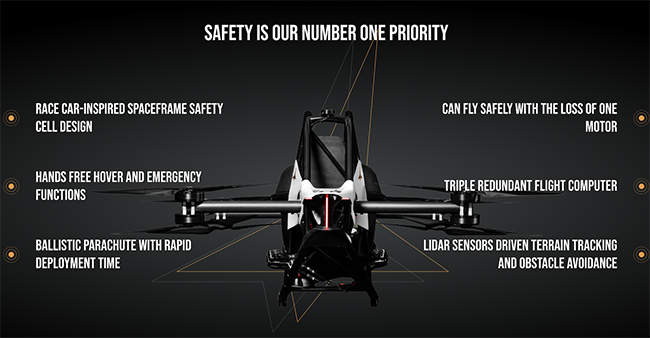Jetson One Takes Personal Flight to a New Level
Safety is at the core of the personal electric aerial vehicle, with the adoption of a carbon-fiber composite safety cell.
October 28, 2021
Your time airborne might not last as long as your typical Jetsons cartoon episode of the 1960s, but the Jetson One might just be your entry-level ticket to electric flight . . . if you weigh in at less than 210 lb. The electric motor–powered Jetson One personal electric aerial vehicle from the eponymous Swedish firm retails for $92,000 and has already garnered enough interest to sell out its entire 2022 build of 12 units, with the 2023 production run starting to be filled. The aerial vehicle is delivered as a partially (50%) assembled kit for home completion.
The Jetson One itself weighs in at 190 lb thanks to its aluminum spaceframe and Formula 1 race car–inspired carbon-fiber composite safety cell. In fact, safety is the number-one priority at Jetson AB — the aerial vehicle is capable of flying with the loss of one of its eight electric motors and it has a triple-redundant flight computer, plastics-intensive LIDAR sensor-driven terrain tracking and obstacle avoidance device, ballistic parachute with rapid deployment time, and hands-free hover and emergency functions.
|
According to the Formula 1 dictionary, carbon-fiber composites are largely unrivalled as a material for impact absorption, with a specific energy absorption — SEA, measured in kJ per kg of material used — far higher than its metallic counterparts, providing design is optimized. “The decision to use CFRP for impact absorption is a fairly easy one. Comparing the SEAs of various materials, steels achieve about 12 kJ/kg, while aluminum reaches around 20 kJ/kg. However, a well-optimized carbon-fiber structure — one with an optimized lay-up/fiber orientation and component geometry — can absorb anything from 40 to 70 kJ/kg in a highly refined and tested design.” The structures have protected race drivers subjected to massive decelerations of 140 mph to zero in 0.78 seconds, for example, equivalent to falling from a height of more than 600 feet, with the effects limited to relatively minor injuries.
Jetson AB was founded by Peter Ternström and Tomasz Patan in 2017. “We intend to make everyone a pilot,” they said at the time. Their prototype "proof of concept" was finished in the spring of 2018, and until now they have been busy working on a consumer-friendly version. The lithium-ion-battery–fueled debut version has a flight time of 20 minutes for a 187-lb pilot, and a software-limited top speed of 63 mph.
About the Author(s)
You May Also Like


.jpg?width=300&auto=webp&quality=80&disable=upscale)

